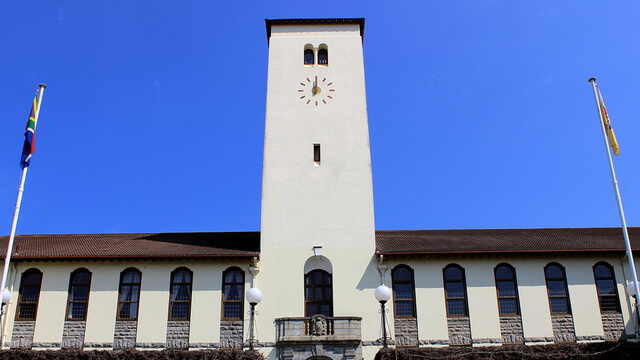
Specialist training for staff, strict protocols including daily screening, physical distancing, hand hygiene and mask-wearing, are in place as the university this week welcomes back on campus the first cohort of students who have been identified in line with the criteria set out by the Department of Higher Education & Training (DHET). These include senior science and pharmacy students, students with disabilities and students whose home environment is not conducive to quality learning.
Training for relevant staff members has included the application of basic microbiological cleaning principles targeting SARS-CoV-2. This method is guided by the Global Bio Risk Advisory Council’s (GBAC) protocol for response and remediation and the practical guidelines of the Professional Body for Environmental Hygiene in South Africa.
“The University has had to balance a number of serious priorities to get to this point. On the one hand, is the health, wellbeing and safety of students, staff and our surrounding community, and on the other, the academic programme, the futures of our students and livelihoods. In our decisions, we are guided by the three-pronged theme of the Department of Higher Education & Training – save lives, save the academic year and maximise opportunities for student success.
The COVID-19 pandemic is however still our reality. There are a number of important voluntary individual responsibilities that each one of us will have to exercise at this difficult time to create a safe and conducive environment for teaching and learning,” Vice-Chancellor Dr Sizwe Mabizela said.
To support these individual initiatives, new systems, processes and rules have been approved and communicated. The Students Disciplinary Code, Hall and Staff Codes have, accordingly, been reviewed. This is in the interest of the Rhodes University community in general to deal effectively with the enforcement of Government Regulations relating to COVID-19.
It should, however, be emphasised that curbing the spread of the virus in our community is less about the University’s capacity or capability to enforce the stringent measures that are in place, and more about the individual responsibility and agency of each student and staff member to safeguard their own health and wellbeing and that of the other members of our community, Dr Mabizela said.
Upon first time arrival, students, both residential and oppidan, are required to self-quarantine for a 14-day period. Meals for residential students will be delivered to their rooms.
During this time, online teaching and learning will continue.
Everyone entering campus will be screened daily. Specially-trained volunteers will also do screening within the residences and classrooms.
Where COVID-19 symptoms are detected, the person concerned will be referred to the Health Care Centre (HCC). All volunteers are trained in maintaining confidentiality and in the proper use of Personal Protective Equipment (PPE), which will be supplied to them.
In the case of confirmed COVID-19, the HCC shall immediately consult with the Department of Health (DoH).
Planning and preparation for the resumption of in contact teaching and learning in special cases, has been carried out in the last month. Residences, student centres, lecture halls, dining halls and labs have been disinfected and sanitised to ensure maximum safety as prescribed in official guidelines.
Among the applicable protocols are the following:
- Returning students are required to screen themselves before leaving home. Any student who presents with COVID- 19 symptoms is requested to be tested, wait for results at home and only make travel plans when negative results are confirmed.
- Daily cleaning and disinfecting will be undertaken to maintain a safe environment for students and staff.
- Where positive COVID-19 cases are confirmed, such spaces shall immediately be closed off and the applicable health guidelines shall be followed.
- The two-metre physical distancing rule shall apply in all shared spaces, including dining halls and lecture venues and standing in queues.
- Students are especially encouraged to avoid physical contact such as handshaking, and hand-to-hand contact through the exchange of paper, cellphone devices, or any other material or commodity.
- Hand sanitiser dispensers will be made available to students, lecturers and cleaning staff to use before entering and re-entering various buildings.
Understanding that this “new normal” can be overwhelming, frightening and isolating, the Counselling Centre has developed several plans for psychosocial support for students.
“Students who, by their conduct, place the well-being of other students at risk may face exclusion from Rhodes University or from residences. Each one of us has a serious responsibility towards all those with whom we share spaces and facilities. Careless and reckless conduct will attract immediate reaction and stern consequences,” concluded Mr Luzuko Jacobs, Director: Communications & Advancement.
For more information on the applicable protocols, guidelines and frameworks, please visit: https://www.ru.ac.za/cvrtt/
